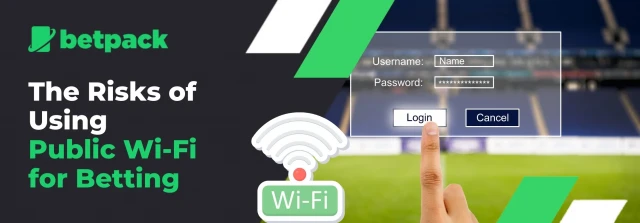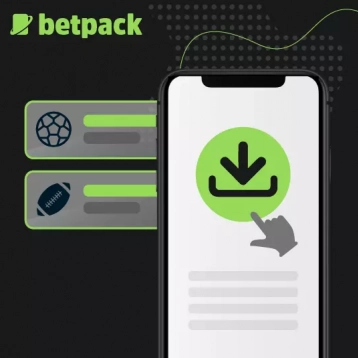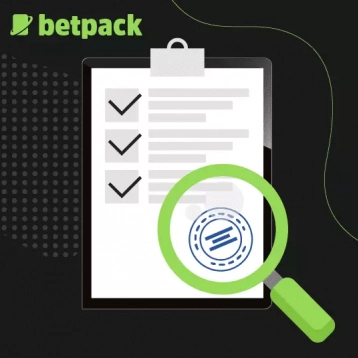- Betpack /
- Betting Guides /
- Betting Scams /
- The Risks of Using Public Wi-Fi for Betting
How Public Wi-Fi Works and Why It’s Risky
Public Wi-Fi networks, such as those at cafés, hotels, shopping centres, and airports, are often not properly secured. Unlike private networks, they rarely utilise encryption. That means your personal and bank details are transmitted via unsecured networks, where information might easily be intercepted by cybercriminals. Moreover, fraudsters may often set up fake Wi-Fi access points, mimicking real ones, tricking users into directly feeding them usernames, passwords, bank card details, contact information, and other data intended to stay private.

Common Cybersecurity Threats on Public Wi-Fi
Whether you are using a mobile browser or wagering via dedicated mobile betting apps, it is essential that you are aware of the security risks associated with public Wi-Fi networks. Below, we outline the four most common types of cyber threats lurking on unsecured networks.
Man-in-the-Middle (MITM) Attacks
In MITM attacks, hackers position themselves between your mobile device and the network. That allows them to intercept the information you think you are sharing privately and provides them with uninterrupted access to your personal and financial data.
Packet Sniffing
Public networks may be monitored by cybercriminals round-the-clock, looking to capture unencrypted data. This method of seizing information is called packet sniffing, as hackers leverage the network's lack of proper encryption to eavesdrop on the communication between you and the betting site.
Fake Wi-Fi Hotspots
Fake Wi-Fi networks are also common. Also known as honeypots or lookalike networks, these access points mimic legitimate ones to trick users into establishing a connection with the fake network. Since they are purposefully designed to hijack data, bettors using them are exposed to severe risks.
Malware Injections
Unsecured Wi-Fi networks can be used as channels for spreading malware, with viruses or other malicious software inserted in them. Once this happens, the public Wi-Fi network becomes a conduit for the malware, infecting the devices of bettors accessing sportsbooks.
How These Threats Affect Betting Accounts
Bettors are particularly vulnerable to the cybersecurity threats associated with public Wi-Fi. Even when accessing legitimate online bookmakers, they expose themselves to risks that may have far-reaching consequences, as a lot of super-sensitive information is often shared during account registration, KYC verification, and sportsbook transactions.
Unauthorised Account Access
Hackers can perform betting account takeovers using the login credentials they intercept. This should worry bettors, as, in addition to unrestricted access to betting histories and sensitive data, hackers can take full control of the online gambling account and funds in it.
Withdrawal Fraud
One of the top reasons why hackers take control of online betting accounts is to gain access to the betting payment methods section and your financial details. Even more worryingly, if they are not prevented by the online gambling site, cybercriminals can perform fraudulent financial transactions, such as withdrawals to their own wallets or accounts.
Betting Account Manipulation
While tampering with funds is a big concern, hackers can manipulate betting accounts in various other ways too. These include cancelling bets or placing wagers of their own. Betting account activity of this type can have dire consequences, leading to additional losses and rendering your compromised account no longer recoverable.
Identity Theft Risks
Unfortunately, losing access to your betting account is not the worst thing that can happen. Consider the implications of fraudulent individuals obtaining your personal information and misusing it, long-term. Such misuse will affect your personal reputation and access to various services, so you might want to think about joining no-verification betting sites with no KYC required.
How to Stay Safe When Betting on Public Wi-Fi
Even though the risks of using public networks are evident, bettors with no other option can take several steps to reduce the likelihood of being hacked. In addition to choosing legitimate betting platforms and learning how to avoid falling for fraudulent bookmakers, these are some steps you can take to improve your security even when using public Wi-Fi.
 Step
1
Step
1
Use a VPN
Encrypting your data and enhancing your privacy, a Virtual Private Network (VPN) is an effective tool to minimise the risk of hacking and one that many bettors use, especially at VPN-friendly bookmakers that allow the use of VPNs to access their online gambling platforms.
 Step
2
Step
2
Avoid Logging into Betting Sites on Public Wi-Fi
Of course, if you have an alternative, such as using your mobile data, try to avoid signing into your betting account on public Wi-Fi altogether. As one of the most significant security risks to bettors on the move, public networks are best avoided.
 Step
3
Step
3
Stick to Secure Websites (HTTPS)
The S in HTTPS is there for a reason. It tells you that the site is secure and utilises industry-standard encryption to protect your personal data by scrambling all internet traffic. So even if hackers intercept it, they won't have instant access to unencrypted data.
 Step
4
Step
4
Turn Off Automatic Wi-Fi Connections
Keeping the Wi-Fi on your mobile device turned on increases the risk of inadvertently providing fraudsters with access to your data. Therefore, it is best if you only turn on Wi-Fi connections when you are within the range of secure networks.
Final Thoughts on Betting Safety and Security
All in all, public Wi-Fi networks often seem like an enticing and convenient option for online gambling enthusiasts on the go. However, they also pose significant security risks, such as unauthorised account access, misuse of personal information, and the potential for someone else to tamper with your betting account funds.
Therefore, it is essential to always choose private Wi-Fi networks with robust security measures or adopt a proactive approach if you must use a public network. Additionally, choosing legitimate betting platforms that prioritise player protection and adhere to responsible gambling practices can also go a long way to ensuring you are safe when betting online.

